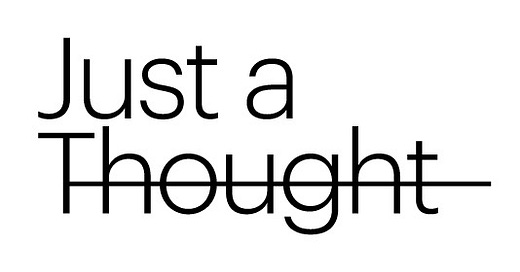On March 22, 2021, the Maryland Terrapins men’s basketball team—a squad that I have traveled far and wide to watch play in the past—got trounced by the Alabama Crimson Tide, 96-77 in the NCAA Tournament. I watched maybe five minutes of it.
The day before I noticed that the alma mater of my esteemed Just A Thought co-founder, the University of Florida, was playing Oral Roberts. I thought I should pay attention in case it came up in one of our Slack chats. The game was a big upset, with 15-seed Oral Roberts squeaking by the 7-seed Gators, 81-78. That one, I caught maybe three minutes of.
This limited viewership isn’t because I don’t care about sports. I love sports. I spent 13 years as a reporter and editor for Sports Illustrated (and getting impersonated as such). I interviewed LeBron James for the first time when he was a junior in high school. I’ve covered multiple Super Bowls (I saw the “wardrobe malfunction” live) and an Olympics as well as countless smaller events. I’m a huge believer in the power of sports and their ability to reveal the potential of the human spirit and to teach lessons about perseverance and collaboration.
But I just don’t watch sports that much anymore, and I want to know why.
Let’s start with the reason for everything over the past year: the pandemic. In my mind, the pandemic officially started nationwide in the U.S. when NBA player Rudy Gobert tested positive for Covid-19 (infamously touching all the reporters’ recorders) and the league suspended its season. When the NBA resumed its season in the bubble, I couldn’t get into it.
The lack of fans and noise (the piped-in stuff doesn’t cut it) was a big factor. If other people weren’t visibly caring about the game being played, why should I? The lack of friends impacted things, too. Sports fandom is based largely around debate and discussion. The best of these happen IRL, and social distancing prevented that.
However, the pandemic can’t shoulder all the responsibility for my declining interest because, if I’m being honest with myself, that started before 2020. I blame commercials. So much is made about how live sports are the only thing keeping broadcast television going. (The NFL just doubled the amount it will collect for broadcast rights.) And brands still pay big money to market their products during those events. But to me, every commercial break during a game is an exit ramp, a chance to change the channel. And often when I change the channel, I don’t return.
That’s why the sports that I do find myself watching the most these days are the ones with fewer interruptions, like the Premier League and Formula 1. By minimizing the commercial breaks, those sports allow a rhythm to develop, which captures my attention and prevents me from dipping out at the first available opportunity.
The final reason though is drama. I watch sports because I believe that every game is an opportunity to see something I’ve never seen before. As a kid, I’d watch games where my favorite team, the Washington Capitals, were trailing as time ran out and console myself by saying, “It only takes one second for a puck to cross the line.” I didn’t think it would happen, but I never stopped believing that they could. That was compelling enough of a reason to keep me coming back for more.
Today, I find that sports drama in places other than live games. I’ve always been a sucker for any sports documentary, and it feels like we are living in a golden age for the genre. From Hard Knocks to 24/7 to Last Chance U to The Last Dance to Formula 1: Drive To Survive, I’ve been able to sate my desire for compelling sports stories in tight 30- and 60-minute windows instead of three-hour-plus slogs.
But what’s lost with these tidy after-the-fact tales are those “I remember when” moments that can only occur from seeing events unfold live. I miss those moments, and hope to experience them again. I don’t know if it will happen, but like with the Caps, it could.
The Former World Champion Surfer Who’s Now Driving A School Bus
Speaking of the power of sports, I really enjoyed this story about surfer Pauline Menczer, who won the ASP world title in 1993, but didn’t receive any prize money for her accomplishment and now makes a living as a school bus driver in Australia. The release of the documentary Girls Can’t Surf shined a light on Menczer’s situation and a GoFundMe raised money to pay her the money she would have earned. The story gets better from there, but I won’t spoil it.
–Justin
Billie Eilish: The World’s A Little Blurry
This isn’t the first time you’re hearing a recommendation for this documentary, but hopefully it’s the last time you glance over one without watching it. Historically, my take on pop stars has been that I recognize it’s a hard lifestyle, but I don’t feel bad for them. Historically, I was wrong. I feel equally terrible for and proud of “millionaire Billie Eilish.” I cried many times and only a couple were because of Justin Bieber.
–Andrew
The Wiggles cover Tame Impala 'Elephant' for Like A Version
Did someone mention pop stars? I have so few words to describe this. Brilliant? There, I think that does it. Fruit mf salad. Yummy yummy.
–Andrew






